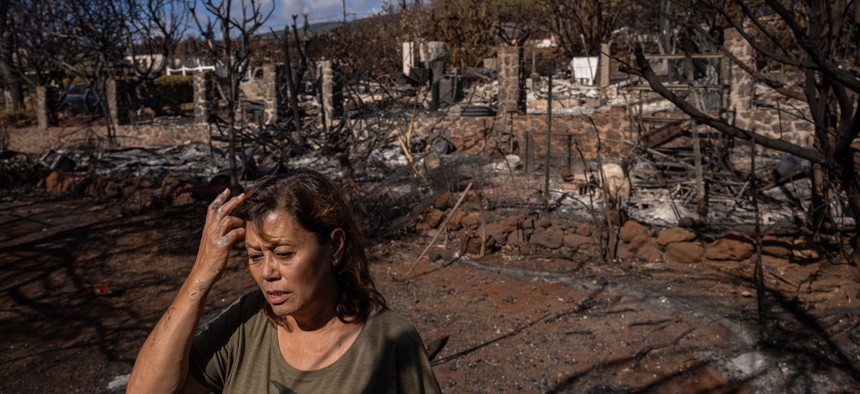‘Disaster gentrification’ looms over Lahaina

Val Casco looks out onto the backyard of her home, which was destroyed in the Aug. 8 wildfires in Lahaina, Hawaii. Experts warn that without careful strategy, high housing costs could prevent locals from returning to their neighborhoods. Tamir Kalifa for The Washington Post via Getty Images

Connecting state and local government leaders
The Hawaii city is recovering after a wildfire killed at least 115 people and destroyed more than 2,000 buildings. A top concern for officials is preventing local residents from being priced out.
As Lahaina, Hawaii, continues down the long road toward recovery after August’s devastating wildfire, longtime residents who lost their homes could be permanently pushed out of their neighborhoods due to high housing costs, state economists warned. It’s a phenomenon known as “disaster gentrification,” one expert said, and it takes careful planning and community engagement to avoid.
A Sept. 22 economic forecast from the University of Hawaii Economic Research Organization detailed how the housing landscape in Lahaina could change without government intervention.
“When reconstruction is eventually complete, the housing stock will be new-build housing in a coveted location,” the report said. “Market prices for this new housing are likely to far exceed the already high prices that existed in Lahaina before the fire.”
That puts a financial squeeze on longtime Lahaina residents, but they’re far from the first community to navigate this kind of challenge, according to Andrew Rumbach, a senior fellow with the Urban Institute.
“It's very common in almost every disaster,” he said. Building homes is much more expensive now than it was several decades ago, and those increased costs will be passed to homebuyers and renters. Plus, when natural disasters remove homes from the market, the reduced inventory jacks up prices for the buildings that did survive, Rumbach added.
Many of the homes that burned down in Lahaina were 40 or 50 years old, according to Justin Tyndall, an assistant professor of economics at the University of Hawaii. That older housing stock was more affordable to locals, especially compared to the skyrocketing prices across the state.
“They were very old units with all of the issues that come along with older units and just weren't really appealing to outside investors or people looking for ritzy vacation homes,” Tyndall said. But with many of those units burnt to the ground, there’s a risk of wealthy outsiders replacing them with multimillion-dollar single-family homes.
Rumbach pointed to similar cases elsewhere. In New Orleans, home prices skyrocketed in the years after Hurricane Katrina. In Boulder County, Colorado, an Urban Institute study tracking recovery from the 2021 Marshall Fire found that wealthy households were much more likely to rebuild their homes.
The housing crunch is a problem that’s been top of mind for Gov. Josh Green. Shortly after the fire, he issued an emergency proclamation prohibiting unsolicited land offers in an effort to prevent deep-pocketed investors from purchasing land from locals in a vulnerable situation. But it’s unclear if an outright ban on sales would be legal or even beneficial, Tyndall said.
“No one wants to see land speculators scooping up all of this land,” Tyndall said. “But at the same time, the people who've lost their homes are in stressful financial situations, so putting additional constraints on them is also potentially problematic.”
Like many communities nationwide, Lahaina is primarily zoned for single-family housing. But without significant government subsidies, new homes will be largely out of reach for those who were displaced by the fire, Tyndall said, especially since many residents were renters without fire insurance that could help pay for a new home.
One way to help the community’s equitable recovery would be by upzoning lots to accommodate more multifamily housing, a solution Lahaina had initiated even before the fire. Unfortunately, a newly-finished affordable development was destroyed in the fire and will “need to be replaced and potentially expanded if they're going to be able to provide units at a reasonable price point for the people who were displaced,” Tyndall said.
Lahaina officials might also reconsider the number of properties eligible to operate as short-term rentals, Rumbach said. Critics say these units, often listed on sites like Airbnb, diminish housing options for permanent residents.
But updating zoning rules won’t be enough to keep longtime residents in the area, because those changes require a long, complex process and can face strong opposition, he added.
“[Disasters] oftentimes will lead to policy changes that wouldn't have happened otherwise and they can be a great force for positive change in local policies like zoning,” he said. “But it's also a time of really significant pressure on the government to act and to move quickly.”
Government affordable housing programs will also be a part of the solution, Tyndall said. At the federal level, programs that support the construction of permanent affordable housing managed by state and local government agencies can also be powerful tools, Rumbach said. If those spaces are built, state and local officials can prioritize disaster victims for those units, he added.
Community engagement is critical for effective disaster recovery. State and local officials must engage with the entire affected community, not just those who have the time to attend in-person meetings.
Residents who were disadvantaged prior to the disaster are often left out of recovery conversations because they work multiple jobs, have long commutes to work or have trouble finding child care. Without their voices, officials can’t shape an equitable and impactful recovery approach.
“If you want people to be able to return and afford this place, we have to do things differently—otherwise, the housing market will not provide affordable housing,” he said. “Only through these kinds of reforms, only through really good use of funding, will they be able to create housing that the folks who are displaced will be able to afford.”

NEXT STORY: Why fentanyl trafficking enforcement may fall short





